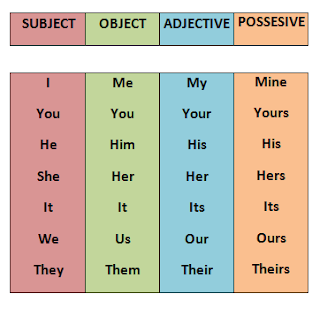Απο εδώ μπορείτε να κατεβάσετε τα θέματα του Κρατικού Πιστοποιητικού του Μαίου 2012
Friday, May 18, 2012
Thursday, May 17, 2012
POSSESSIVE PRONOUNS

Remember that pronouns always take the place of the noun and everything that goes with the noun. The possessive pronouns (mine, yours, his, hers, its, ours, theirs) are used instead of the possessive + noun to indicate possession. Let's see some examples:
That car is my car -----> that car is mine
This book is Mary's book -----> this book is hers
And, of course, some exercises for you to practise!!!
Exercise 1 Complete the sentences with a possessive pronoun
Exercise 2 Change the sentences so that they have a possessive pronoun. There is an example.
Exercise 3 Complete the sentences with a possessive pronoun
Exercise 4 Choose the correct answer
Exercise 5 Complete the sentences
Exercise 6 Complete the sentences according to the person in brackets.
Saturday, May 12, 2012
Thursday, May 3, 2012
Some more advice before the exams

- at what time of the day do you read the best? Find it!
- cultivate good reading habits: for example, take breaks and make sure it’s quiet, when you read.
- find out what kind of breaks and how many of them you need. Some do sports, listen to music, watch TV or hang out with friends. It’s important you take different kinds of breaks and get new energy. Socialize, so you don’t feel like your life is only about exams.
- when preparing for exams, finish each day with going over the next day’s material based on what you’ve already covered.
It's often best not to study anything new just before an exam. "Revision" means studying what you have already studied to make sure that you know it well. The aim is to be confident about what you do know, rather than worrying about what you don't know.
Subscribe to:
Posts (Atom)

